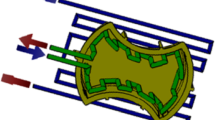Abstract
This study discusses an automatic design method of injection mold cooling channels using a genetic algorithms (GA) and a finite element method (FEM), combined with an evaluation function based on unsteady-state heat transfer and linear static deformation. The uniformity of cooling and the deformation effect were observed in the injection mold with the automatically designed cooling channel through a verification experiment. The genetic algorithm was applied in the following steps: the generation of finite elements of individuals expressing different cooling channel shapes, the definition of the fitness function to evaluate individuals, the genetic operation for individuals, and the automatic generation of the cooling channel shape. Finally, based on a molding experiment, the cooling and deformation effects were investigated. Results of resin cooling uniformity, temperature distribution of molding parts, and deformation of mold were demonstrated.
Similar content being viewed by others
References
Park SJ, Kwon TH (1998) Thermal and design sensitivity analyses for cooling system of injection mold, part 1: thermal analysis. J Manuf Sci Eng 120(5):287–295
Sachs E, Wylonis E, Allen S, Cima M, Guo H (2000) Production of injection molding tooling with conformal cooling channels using the three dimensional printing process. Polym Eng Sci 40(5):1232–1247
Koresawa H, Sakashita M, Suzuki H (2001) Automatic design for parting line on injection mold, ANTEC, pp.937-941
Matsumoto T, Tanaka M, Yamamura A (2000) Optimization of cooling channels of injection mold using GA and BEM. J Japan Soc Mech Eng (A) 66(641):14–19
Yao D (2002) Development of rapid heating and cooling systems for injection molding applications. Polym Eng Sci 42(12):2471–2481
Matsumori T, Yamazaki K (2008) A study on optimal layout design of cooling channel for plastic injection molding die. J Jpn Soc Mech Eng (C) 74(3):239–246
Yoneyama T, Kagawa H, Ito T, Iwane A, Kuramoto Y, Nishimoto K, Yan C (2001) Effective cooling and accuracy improvement in injection molding using a metal mold with cooling channels composed by laser sintering (1st report): fabrication of a mold with cooling channel and verification of a basic effect. J Jpn Soc Precis Eng 67(12):1991–1995
Chen TY, Chen CJ (1997) Improvements of simple genetic algorithm in structural design. Int J Numer Methods Eng 40:1323–1334
Jensen E, Topological structural design using genetic algorithms, Doctor of Philosophy Thesis, Purdue University, November
Takafuji A, Tamura K, Yokoyama A (2003) Optimum design method for injection molding die by genetic algorithm. Seikei-Kakou 15(5):357–362
Galante M (1996) Genetic algorithms as an approach to optimize real-world trusses. Int J Numer Methods Eng 39:361–382
Author information
Authors and Affiliations
Corresponding author
Rights and permissions
About this article
Cite this article
Liang, J., Narahara, H., Koresawa, H. et al. Verification and evaluation of automatically designed cooling channels for block-laminated molds. Int J Adv Manuf Technol 75, 1751–1761 (2014). https://doi.org/10.1007/s00170-014-6260-2
Received:
Accepted:
Published:
Issue Date:
DOI: https://doi.org/10.1007/s00170-014-6260-2




